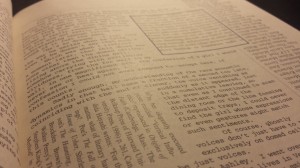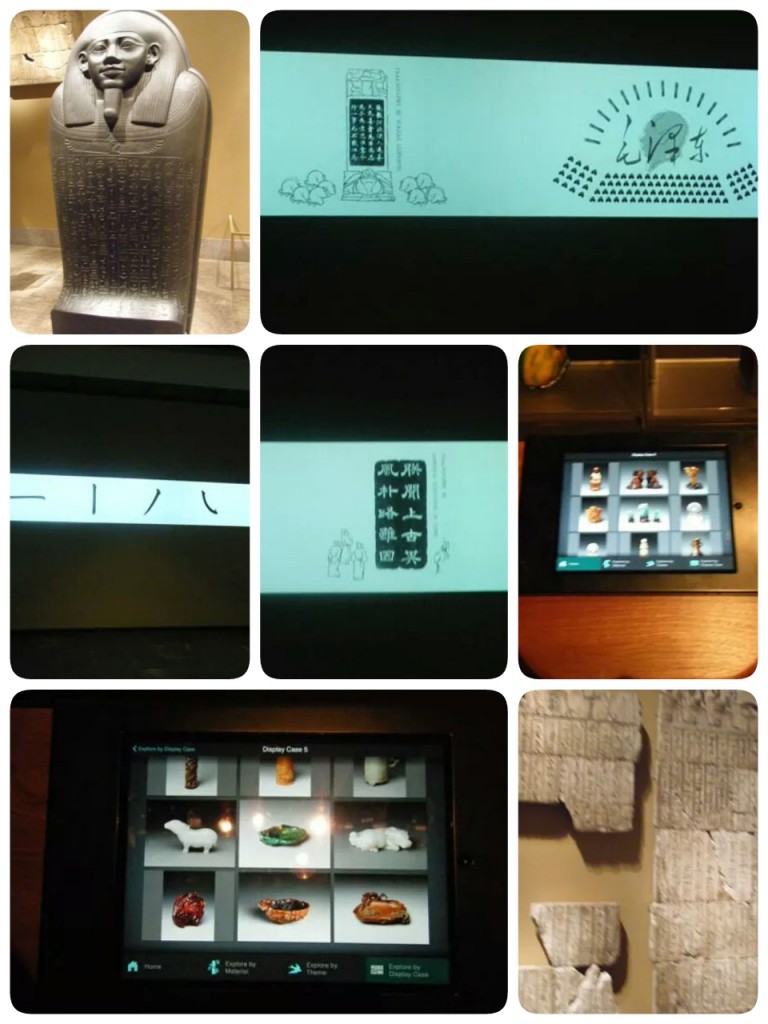Digital Humanities: Instilling Optimism in Academia

House of Leaves, by Mark Danielewski. Text no longer moves in one direction.
“I consider this mutability of language a wise precaution of Providence for the benefit of the world at large, and of authors in particular. To reason from analogy, we daily behold the varied and beautiful tribes of vegetables springing up, flourishing, adorning the fields for a short time, and then fading into dust, to make way for their successors. Were not this the case, the fecundity of nature would be a grievance instead of a blessing. The earth would groan with rank and excessive vegetation, and its surface become a tangled wilderness”
-Washington Irving, “The Mutability of Literature”
Studying Digital Humanities is something I never knew I wanted. Years after beginning my undergraduate career I cursed myself for choosing an English degree. Sure, I loved reading and discussing literature, but aside from pursuing a life in academia , what real-world purpose did it serve that I could parse the connection between the sarin gas attacks in the Japan subways in 1995 and Murakami’s depiction of time in A Wild Sheep’s Chase? Sure, I have a handful of sonnets memorized, and while they might be fun to recite in front of girls, they most likely won’t get any potential employers in bed with me. I had so many interests growing up! Why did I choose the one that—based on my limited knowledge of the job market—seemed so fruitless? In my free time I studied digital rights management, so why didn’t I change my major to law? When I was 13 I learned HTML while playing Neopets, so why didn’t I change my major to Computer Science? After writing a research paper on digital media, consumer convenience, and the future of software models, why didn’t I go for business? Finally, why did it take me so long to find out that Digital Humanities was a thing?
After finishing my undergraduate English degree (get this… you’ll never believe it…) I applied for a doctoral degree in English. Unbelievable, right? Despite my utter pessimism about the efficacy of studying text, I decided to study text some more. I believed that I would either end up a professor of English, or quit academia and get a job working in new media and digital software, parallel, yet distant paths. One day I would stray too far in one direction and the other path would be forever obfuscated, lost in a sea of software or perhaps a forest of leaves. Before hearing back from graduate schools, I filled my time by recording a weekly podcast about video game sub-cultures. A friend and I bought recording equipment, learned audio editing, studied distribution methods via RSS feeds, built a website, and wrote a list of topics that would last us over a year. We got together every week, and recording the show became a labor of love. Not only did I get to speak passionately about a topic I was enthusiastic about, but I became a participant in active conversations regarding e-sports in America, online streaming, and the efficacy of new business models for digital software. I worked for hours every week drafting show notes, learning history, and gathering opinions from experts to discuss and refute. This solidified that reading and writing text could not be my sole future. When I was contacted by a representative from the Graduate Center, it was to tell me that I was not accepted to a doctoral program, but also that I should consider a Masters track for Digital Humanities, as it seemed better aligned with my interests and work. I wasn’t upset, just intrigued. After reading up on DH, I realized I wasn’t just interested, I was already a participant. In fact, many people with my interests were already unknowingly participating in Digital Humanities.
Not only did Digital Humanities as a concept renew my interest in academia, it renewed my interest and optimism in English and Literature as a viable track of study. While text continues to be an important facet of humanism, there are many alternative media formats, such as films and games, that can speak on similar subject matter, albeit, without the seniority. Digital Humanities not only grants us a space to re-examine texts in digital formats and tools, but creates a bridge through which English might become a more multi-faceted, interdisciplinary track. After all, being able to read and write at the highest academic levels seems attractive when you consider just how much you’re reading and writing through social media platforms.
I believe that Digital Humanities has the ability to alter the approaches and pedagogy of not just English, but any discipline held back by the trappings of academia. Lisa Spiro states in her essay, “This Is Why We Fight” that “emphasis on specialization and professional authority clashes with the collaborative, crowdsourced approaches of the digital humanities”, and I believe this to be the definitive attraction to DH: it truly encourages an iterative, interdisciplinary approach, whereas many tracks and individuals intentionally alienate themselves in an attempt to gain absolute authority over their ideas. How does that better the medium? How can one learn and innovate if they shut themselves out from all that is available to teach?
There’s so much more to say, but this is already far too long. I have so many questions and so many ideas, all I can say for certain is I’m optimistic about the future.
![]() Latin as a “mental discipline” (Hockey 1986).” The key: “as a mental discipline”; a way to train the mind that serves universal cohesion and collaboration. I studied Latin in high school, prodded along by the wishes of my grandmother, a woman who sincerely believes in the value of an ‘old-school’ education. But what about computer programming? She couldn’t wrap her head around it. ‘Why were they in the same sentence?’. I told her about it, the class I am taking: “Digital Humanities”. Have fun explaining that one; I give a different answer to nearly everyone I ask; but there is something there. I don’t speak the language yet, the ‘universal’ core, which maybe at one point was Latin, and is now computer programming (all I remember about my high school Latin is a massive amount of tables — filling in and creating conjugation charts and applying said tables to various activities — which from my understanding is what under-girds a lot of programming: tables, and the relationships therein) but I hope to get there. The separation of powers between the humanist with the ‘idea’, and the programmer with the ‘skill’ to bring this idea into the concrete reality of 1s and 0s (and maybe 3s) will hopefully be blurred and people who think like us will get some agency back.
Latin as a “mental discipline” (Hockey 1986).” The key: “as a mental discipline”; a way to train the mind that serves universal cohesion and collaboration. I studied Latin in high school, prodded along by the wishes of my grandmother, a woman who sincerely believes in the value of an ‘old-school’ education. But what about computer programming? She couldn’t wrap her head around it. ‘Why were they in the same sentence?’. I told her about it, the class I am taking: “Digital Humanities”. Have fun explaining that one; I give a different answer to nearly everyone I ask; but there is something there. I don’t speak the language yet, the ‘universal’ core, which maybe at one point was Latin, and is now computer programming (all I remember about my high school Latin is a massive amount of tables — filling in and creating conjugation charts and applying said tables to various activities — which from my understanding is what under-girds a lot of programming: tables, and the relationships therein) but I hope to get there. The separation of powers between the humanist with the ‘idea’, and the programmer with the ‘skill’ to bring this idea into the concrete reality of 1s and 0s (and maybe 3s) will hopefully be blurred and people who think like us will get some agency back.  Micki’s comment about how the computer literacy gap between younger and older generations disrupts and threatens the top down teacher-pupil paradigm has really stuck with me. Though it seems that professors have long been considered at risk of becoming dinosaurs, ossified in their own practices as new ideas outpace them, I get the sense that the discrepancy here and now is far greater.
Micki’s comment about how the computer literacy gap between younger and older generations disrupts and threatens the top down teacher-pupil paradigm has really stuck with me. Though it seems that professors have long been considered at risk of becoming dinosaurs, ossified in their own practices as new ideas outpace them, I get the sense that the discrepancy here and now is far greater.






